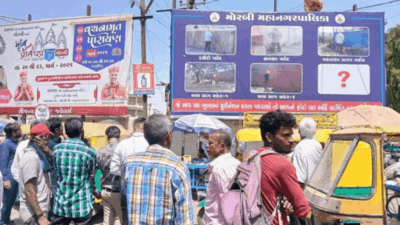- News
- City News
- rajkot News
- In Gujarat, Morbi municipality puts up billboards to penalise men for public urination
Trending
In Gujarat, Morbi municipality puts up billboards to penalise men for public urination
Morbi's newly formed municipal corporation has launched a public shaming campaign to tackle the city's sanitation crisis. Residents seen littering or urinating in public are being named and shamed on strategically placed hoardings, aiming to instill civic responsibility and hygiene.
RAJKOT: As you cringe at the sight of stinking rubbish on Morbi’s streets, a massive poster looms into view—a stark testament to the serious sanitation crisis plaguing India’s famed ceramic town.
Captured in secret, images of people relieving themselves in public now stare back at passersby from hoardings across the city. Their act, previously unpenalised, is now on full display, a bold warning to others.
Once a proud princely state, Morbi is now grappling with unchecked littering, forcing the newly formed municipal corporation to take an extreme step—public shaming. In an attempt to instil a sense of hygiene and civic responsibility, the administration has turned to shock and shame, delivering the message of ‘Swachhata’ in the most unflinching way possible.
In a city renowned for producing India’s finest clocks and tiles, six strategically placed hoardings have become the talk of the town. The blurred photos of offenders serve as a cautionary message, with a blank space ominously warning: “Next Could Be You.”
However, the city lacked an elected civic body since October 30, 2022, when the state govt superseded the municipality following the tragic bridge collapse that claimed 135 lives. In January, the govt upgraded the municipality to a municipal corporation to strengthen local governance and improve infrastructure.
Speaking to TOI, municipal commissioner Swapnil Khare said, “The majority of residents are cooperating with our initiatives, but some continue to act irresponsibly by throwing rubbish or urinating in public. We have put up pictures of offenders littering the city, with their faces covered.”
Khare added that the next phase of the campaign will target those caught spitting in public, dumping rubbish on roads, and burning waste.
In recent days, a special civic team patrolled the city, capturing images of offenders urinating in public. Along with being publicly shamed, they were also penalised.
Despite Morbi’s Rs 50,000-crore ceramic industry employing over four lakh people in 1,800 units, many businessmen and white-collar professionals avoid living in the city due to its filth and poor infrastructure.
While many residents support the crackdown, some argue that punitive measures alone won’t solve the problem. Social worker Satish Kanabar pointed out the lack of proper public sanitation, saying, “We appreciate the Municipal Commissioner’s efforts, but he must first improve infrastructure before enforcing strict rules. There are very few public urinals in the city, and the ones that exist are in a deplorable condition. Nobody can use them.”

About the Author
Nimesh KhakhariyaEnd of Article
FOLLOW US ON SOCIAL MEDIA








